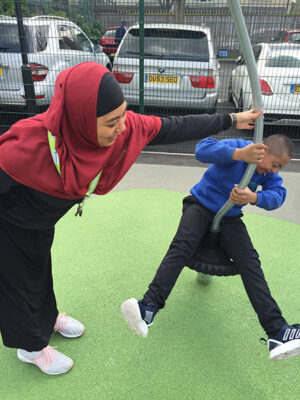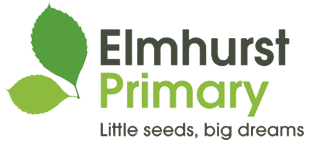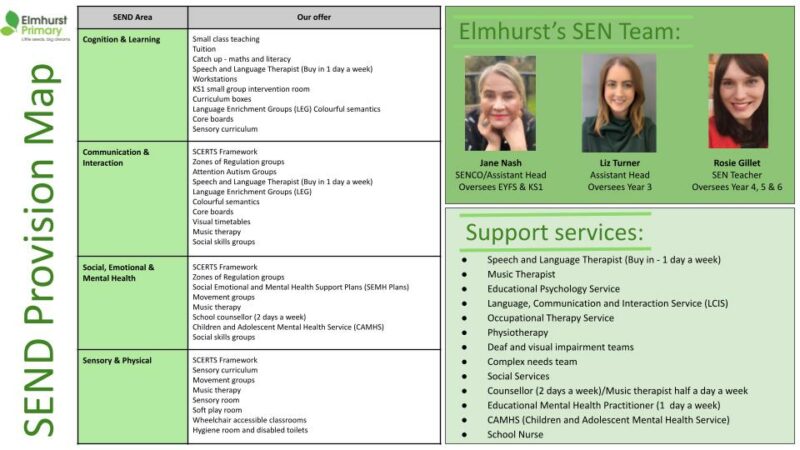We are an inclusive school with a strong belief that with the right support all children can reach their potential. Please direct any queries about inclusion matters to Jane Nash (AHT for inclusion) via the school office or email jnash@elmhurst.newham.sch.uk .
Or to our SEND team:
Elizabeth Turner Elizabeth.turner@elmhurst.newham.sch.uk (AHT – SEND Y3)
Rosie Baron Rosie.gillet@elmhurst.newham.sch.uk (SEND teacher – YR,5,6)
Early intervention

We carefully track pupils from an early stage, in order that any needs are identified as quickly as possible. Any children who are falling behind are given a series of 1:1 individual ‘catch up’ or ‘keep up’ sessions in Maths and or English every day. Children are also offered tuition after school or on a Saturday morning.
Any children causing concern are discussed at a senior leadership level with the AHT inclusion/SENCO and the leadership team discuss individual children in order to decide on the right course of action to support their needs.
School Support
When children are continuing to fall behind, for any reason including speech and language difficulties, learning difficulties, sensory or physical difficulties, we may consider referring for external assessment and advice. A range of professionals are available to give this assessment and advice including: Educational psychologists; Occupational therapists; Speech and language therapists; Physiotherapists and specialist teachers for sensory impairments.
We then arrange training for our teachers and teaching assistants in order that they can differentiate their own teaching and plan appropriately for the child’s inclusion in classroom lessons.
We also have a sensory room, hygiene room, soft play room and small ASD and group intervention room for KS1 children. We also have buy in speech and language therapist one day a week, a music therapist and sports coach, who run specialist music therapy and movement sessions in school.
Children with high level needs may receive extra funding, which is used to provide additional support in the classroom and specialist resources.
SEN Information Report 2023-4
As part of the Children and Families Act 2013, Local Authorities are required to publish a ‘Local Offer’ which sets out support that is available for children and young people with SEN in the local area.
Newham’s Local Offer is available here. This informs parents how to access services in their area and what to expect from these services.
Alongside this, schools are required to publish information about their arrangements for identifying, assessing and making provision for pupils with SEN.
This is the Local offer for Elmhurst Primary School. It describes the arrangements we make that are ‘additional and ‘different‘ for pupils with SEND. This information has been produced together with parents, carers and our children and young people and will be reviewed annually. The following information outlines the support and provision pupils with SEN can expect at Elmhurst Primary School.
Strengthening an ethos of respect and tolerance for the whole school community through improving behaviour and attitudes is one of the four strategic priorities for 2023-24. The work is that we are doing as a school is underpinned by the Equality Act 2010.
SEN Information Report 23 - 24
The Elmhurst Primary School Offer
At Elmhurst Primary School we believe that all children are entitled to have their needs met and to have access to high quality teaching within the mainstream.
ALL pupils will access: High quality teaching and enrichment activities within the school day, as well as access to clubs, trips and residential visits.
Some pupils with additional SEN needs will access:

FAQs about Elmhurst Primary School’s Offer of SEN provision:
How does the school know when a pupil has learning difficulties or special educational needs?
- Some children start school with a diagnosis or with specialist support
- Some children will be identified by school staff and referred for specialist support.
- Some children’s need will be identified through tracking systems, testing and day to day observation by the class teacher or SENCO. These children may have needs which can be met through differentiated teaching, small group work and/or catch up in school.
How is the curriculum matched to pupil’s needs?
- Teachers and teaching assistants plan the curriculum to meet the needs of the pupils.
- Class teacher’s meet termly with the SENCO to plan for children with identified SEN.
- We use indivividual planning for children with high needs. These children will also have SCERTs targets where appropriate (social communication, emotional regulation and transactional supports)
- Lessons are differentiated in various ways and from year 2 to year 6 children are ability set in the mornings for literacy and maths lessons. Some of these sets are smaller to enable more focused teaching.
How does the school know whether pupils are making progress?
- Progress is closely tracked and monitored by class teachers, teaching assistants and assistant head teachers.
- Termly assessments are administered and staff meetings are held to identify those above and below expectations.
- Regular tracking meetings are also held in leadership team meetings.
How are parents/carers informed about how their child is doing?
- Parents have regular communication with class teachers and teaching assistants.
- SEN reviews with the SENCO and external professionals are held for children with SEND in meetings with specialists and in parents evenings and other meetings with SEND team members.
- We plan regular parents evenings and send home annual termly reports.
- We hold parent classes, workshops and coffee mornings in order to improve communication and parent’s ability to support their children at home.
What arrangements does the school make to support pupils transferring from another school?
- All children and their parents have an induction session in which they are shown around the school and supported by a buddy in their class.
- Our staff speak a range of community languages which enable children to access information and learning.
- For children with SEN, a meeting will be held between the SENCOs and information will be shared about the child’s needs.
How is support organized for pupils with identified special educational needs?
- Children are supported in class, in small groups or 1:1 with an adult. Some children receive 1:1 catch up sessions in English and/or maths in the afternoons.
- Some children receive ‘high needs funding’ which is used to provide a higher level of support.
- A range of external specialists work with the school in order to provide training, advice and assessment for children with higher needs.
- The support is overseen and organized by the SENCO/AHT, who manages the support staff and arranges their training.
How are decisions made about how much support individual pupils receive
- Progress is tracked and some children will receive 1:1 catch up for English or maths. They may also be offered tuition after school or on Saturday morning.
- Support may be provided within lessons where needed.
- Teaching assistants may be deployed to teach small groups in English, maths or language.
- If progress is not made then children’s needs are assessed and external advice may be sought.
- Some children will receive high needs funding and a higher level of support is implemented.
How does the school know if the extra support is helping pupils to make progress?
- Progress is regularly tracked and recorded
- Review meetings are held with teachers and parents to discuss individual pupil’s progress
- Teaching assistants support record keeping, planning and tracking of progress and are included in meetings with parents and external professionals where appropriate.
How are parents/carers informed about their child’s needs and what support they are receiving?
- Parents will be invited to an initial meeting to discuss their child’s needs, this will involve the SENCO and class teacher.
- External professionals may be involved and will meet parents to gather information and seek views, before assessments are made.
- Parents will be invited to meetings through the year and will be encouraged to talk to the teacher and/or SENCO if they have any concerns.
- Reviews and Annual reviews will be timetabled and parents and professionals will discuss children to assess progress and support.
How does the school involve parents/carers in planning to meet their child’s needs and in setting targets for learning?
- Parent evenings are held termly for all pupils.
- Through meetings with the teacher, SENCO and/or a relevant external professional.
- Parent workshops are also arranged to support parents understanding of different teaching approaches used by the school eg phonics, maths, language groups etc.
- Annual reviews are held for pupils with high needs and those with EHCP plans.
What expertise and training do the staff who support SEN pupils have?
- All staff are trained internally by the SENCO or visiting external professionals.
- Staff may attend specialist courses which are held at external venues.
- Regular meetings are held for support staff within school to share good practice and to train.
- During INSET days
What specialist support or services does the school access for pupils with SEN?
- Our NHS buy in speech therapist works one day a week to assess and support children in school.
- Educational psychology service including the ‘resilience project’
- Speech and language therapy service
- Complex needs and dyslexia service
- Language communication and interaction team as well as our own one day a week ‘buy in’ speech and language therapist.
- Specialist nurses (eg diabetes, cystic fibrosis etc)
- School nurse
- Visual impairment team
- Deaf team
- Physiotherapy
- Occupational therapy
- Music therapy
- Specialist PE coach
- Specialist art teacher
How are classrooms and other areas of the school adapted to meet pupil’s individual needs?
All of our ground floor classrooms are wheel chair accessible.
We have:
Individual work stations for pupils with ASD in class.
Visual and individual timetables and planning are in place in each classroom.
- hygiene room and disabled toilets
- a sensory room
- a first aid room.
- All classrooms have overhead projectors and smart boards
- We have specialist music and art rooms
- We have plans for a new mobility room.
What arrangements are made to support pupils with SEN taking part in after school activities outside the classroom, including school journeys?
- Allchildren are included in trips and visits as well as residential visits. We provide teaching assistant support and appropriate transport to enable this to happen. All visits are risk assessed and appropriate safety measures are put into place.
- Allof our children, including those with SEN have the opportunity to attend a range of after school clubs. Teaching assistants are provided for pupils who need additional support.
How will the school prepare and support pupils who are transferring to a new school?
- Staff may visit the new school with the child.
- All information will be transferred.
- The SENCO will be invited to observe the child at current school and invited to attend a review and planning meeting.
How does the School support pupil’s overall well-being?
- We provide many enrichment activities including after school clubs and trips.
- We ensure that children’s individual needs are met in whatever way is relevant.
- We will do home visits, go for local walks and teach the children to keep themselves safe.
- Some children may need advocates, which we will organize.
- Children attend their annual review meetings to share their views.
- External professionals will support where necessary to advise children and families who have particular concerns or requirements.
How does the school prepare their pupils for their next stage of education and for adult life?
In the following ways:
- transition visits
- transition books including photographs and timetables
- parents meetings
- sharing information between schools and families
- holding early review meetings which both schools attend
- seeking pupils views throughout
Who can parents/carers contact to talk to about their child’s special educational needs?
Jane Nash AHT for inclusion/SENCO
Who should parents/carers contact if they have a complaint about the SEN provision in the School?
Ms Nash, or the head teacher, Mr Ahmed
Arrangements for the admission of disabled pupils
- We are a fully inclusive school which admits all pupils including those with SEN and disabilities.
- We have a range of specialist facilities, including hygiene room, sensory room, disabled toilets and accessible classrooms.
- Meetings will be held with parents, children and specialists in order to plan admission and ensure that the facilities and resources are in place to enable the child to access the curriculum.
- Appropriate support will be provided.
- Training will be provided for staff.
Regular reviews will be planned, which include the pupil’s views.
Provision for Pupils with EAL
A large majority of our school community have English as an Additional and therefore provision for our pupils is an intrinsic part of how we teach at Elmhurst. Closing the vocabulary gap is a school-wide priority and explicit vocabulary teaching forms part of all lessons.
Particular provision for pupils who are new to English is as follows:
- small group teaching for those new to English across the school (including for Upper Key Stage 2)
- additional catch-up in Phonics to ensure that new arrivals learn to decode quickly
- additional tuition where appropriate
- allowing pupils to write in home language for some lessons to boost confidence


